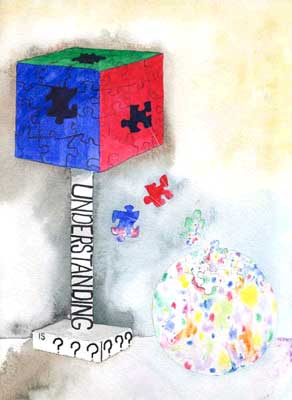Story of Evolution/Evolution of Stories
Bryn Mawr College
February 13, 2007
Sunday afternoon session with Grace Lee Boggs, "Another World is Possible":
Revolution and Evolution in the Twentieth Century
"The people who were teaching me had gone to school in the age of Darwin. So they were useless." Why were her teachers useless? Was it because they didn't have an understanding of class and race? "The way you have phrased the question is not very helpful. According to Hegel, 'Understanding' creates categories, boxes, 'sticks to fixity and distinctness' (vs. the Dialectical, in which these finite characterizations/formulae supersede themselves/ pass into their opposites.)"
Understanding Is...
But first: a bit of coursekeeping
--registrar's list
--creating an account on Serendip's Exchange/logging in to post
--5 p.m. Fri, Feb. 16: Paper #1 due
Write 3-4 pp. in which you think through some problem that has been raised in your mind by our discussion of biological evolution. This is not a "reaction paper" (like your forum postings), but should rather make a claim, develop a thesis, and support it with observations which you have drawn from several new resources you have located (either in the form of written texts or on the web). Bring a hard copy to your section leader's office (Anne's in English House, Paul's in Park), and post a copy of the paper in the course web exchange.
--questions?
...Asking For It

From Megan: "oddly enough, while doing research for another class,
I stumbled across this painting....I thought it accompanied this class
very well. It seems as though the painting itself is asking for truth."
What are we asking for?
What I saw in the forum comments for Week 3 was further discussion of
what it means to do science without a "point", and whether our lives have a "point" beyond passing on our genes (Elise, Jasmine),
the usefulness of difference (Elle: between men and women; Katherine: between humanists, scientists, and social scientists),
how comfortable/uncomfortable we are with random process (Tu, Lavinia and Laura),
the necessity of curiosity (Shannon), and of belief (Ingrid),
the usefulness of invoking the anthropic principle (Caroline),
the importance (when there are immediate potentially harmful effects) of setting skepticism aside (Evan),
and quite a few questions focusing on biological process
(which are the ones I've chosen to highlight today):
What are the observations being summarized by the story of evolution?
Christina: Mayr doesn't give evolution enough credit.
Emily: At the beginning of the month scientists claim to have found the "most primitive primate" from 56 million year old fossils, remains that may cause humans to "redraw [their] family tree"...The story of evolution is constantly being changed by this so-called evidence.
Danielle: it's all circumstantial evidence.
Karen: Mayr...says that "genes cannot be modified through the environment"....he's just talking about gene modification not being able to be passed down by inheritance
Gaby: bacteria can get used to penicillin and get immune to it. At some point the accurate observation that penicillin can cure certain diseases ceases to be true and more medical experiments have to be done.
Lisa: evolution... is trial and error....the "error"...is slowly weeded out...some of us... may be errors.
Hayley: Mayr...writes..."the human brain seems not to have changed one single bit since the first appearance of Homo sapiens, some 150,000 years ago"...I am skeptical....I am really curious to know what are Mayr's observations for making this claim?
Trinh: I think that it is indeed difficult to believe but not entirely implausible....perhaps ...our knowledge...might have accumulated rather than the capabilities to attain that knowledge....we as a species already is a pretty successful player... we are a very viable species. no need to fix what isn't broken.
Tamarinda: "The way things work" seems to be a good place to start
Sarah: what if there actually are not any [natural] laws at all?
EB: : "Evolution does not maximize efficiency" ....Here is an example....Let's think about plants...the Calvin cycle (part of photosynthesis). This cycle takes CO2 and with the help of an enzyme called Rubisco catalyzes it into sugar. But the thing is, Rubisco is totally suboptimal... it works really slowly....it can catalyze in the opposite direction at the wrong temperatures....although...it just so happens to be the most abundant protein in the biosphere....plants have a lot of it and that allows the process to happen at an appropriate speed....photosynthetic organisms are doing just fine! The process works well enough
Andrea: "When a genotype, favored by selection, carries along as hitchhikers a few newly arisen and strictly neutral alleles, it has no influence on evolution. This may be called evolutionary 'noise,' but it is not evolution" (Mayr 199). How could Mayr possibly know what is or isn't evolution when it comes to the change in allele frequencies within a given population? How does he know whether or not in the past, or even in the future, the alleles created great evolutionary change in its carrier?...One of the major aspects of evolution on the micro-evolutionary level is the change of an individual's/population's genotype through the inclusion or exclusion of individual alleles on distinct chromosomes.... why wouldn't "neutral" alleles be considered part of evolution...?
So, hey: why wouldn't they...?
| Course Home Page
| Forum
| Science in Culture
| Serendip Home |
Send us your comments at Serendip

© by Serendip 1994-
- Last Modified:
Wednesday, 02-May-2018 10:51:45 CDT

